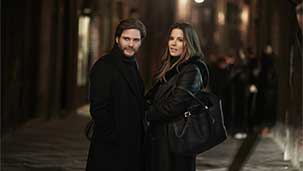This will come as no surprise to you, but you don’t actually appear in this movie. I’m not going to let that stop me from wishing you did.
You and director Michael Winterbottom have collaborated so often that you can’t blame me for picturing you as the lead of his latest film, The Face of An Angel. This wannabe sexy thriller takes itself so seriously that it’s almost a comedy. Almost. Unfortunately, we don’t have your deadpan delivery to exaggerate the pomposity of a film about yet another white male having an existential crisis.
The Face of An Angel purports to tell the story of the real-life murder of exchange-student Meredith Kercher in Perugia, Italy in 2007. Kercher’s roommate, Amanda Knox, along with Knox’s boyfriend and another man were convicted (and in Knox’ case, eventually acquitted) of the murder—but instead, we suffer alongside Daniel Bruhl (an actor far too talented and interesting to have been wasted on this wank) who, as a filmmaker named Thomas, is searching for an angle from which to tell the story as a movie. Thomas – who is wrestling with dark thoughts about his ex-wife (a starlet who cheated on him with her co-star), and feeling alienated from his young daughter – begins to unravel in his attempts to make sense of the infamous murder case.
The film starts out cleverly enough, with Thomas meeting Simone, a savvy journalist who has written a book about the case. Simone advises Thomas to write his script as fiction to avoid a lawsuit, telling him there were many things she couldn’t include in her book because they were true. This bit of exposition gives Winterbottom creative license with the story. Names and locations are substituted, but the details of the notorious case remain the same.
This should have been the first clue that my excitement about a director as skilled as Winterbottom taking on a story as twisted as the Amanda Knox case was perhaps misdirected.
The character of Thomas seems almost to be a proxy for you, Steve—at least the meta-version of you from films like The Trip: smug, prone to jealousy, chases women half his age, an absentee father, known to overindulge. It almost seems like your friend Michael saw this as a comedic role for you, and when you couldn’t commit, he threw his hands up and said, “bugger it all, I’ll just make it a thriller.”
I hope you regret turning it down. Thomas becomes obsessed with telling the story using Dante’s Inferno as a device, which would explain the unintentionally funny CGI demons that attack Thomas in dark cobblestone alleys and his laughably perverse coke-fueled visions, which look like something from an episode of Criminal Minds. Just think of how much fun you would have had filming that!
Thomas has a brief fling with Simone, probably because he’s attracted to how well she delivers exposition (she doesn’t do much else). He enters into a weird relationship with Melanie, a barely-legal student and subdued British version of the Manic Pixie Dream Girl. It would have been a thrill to watch you navigate between these two women with your trademark pretentious incompetence. Instead, we’re subjected to countless scenes of Bruhl brooding in cars, trattorias, and on Tuscan hotel balconies.
Winterbottom seems genuinely interested in reminding us that Sarah (Meredith Kercher’s proxy) was a person, and not just the victim of a sex crime (going so far as to dedicate the film to Kercher). Thomas is forever at odds with the tabloid reporters and TV execs who are intent on exploiting every detail, however salacious, about the schoolgirl’s murder. In these moments – when Thomas interacts with the world-weary, cynical journos – Winterbottom recalls some of the brilliance of his 1997 film Welcome to Sarajevo. Lines like, ”trials are like X-Factor; if they like your face, you win,” are biting and true. But the impact of these statements is immediately undercut by Thomas’ incessant whining about “telling the truth, dammit!” Scenes in which Thomas has to endure a studio exec’s inane feedback are played so flatly they almost disappear. In your hands, Steve, these exchanges would have been just as grating and bloviated, but way more fun to watch. Without your dry comic timing, Winterbottom’s points come across as butthurt complaints instead of cutting observations.
Your inimitable talents would have completely changed the tone of the film, which swings from dull to ridiculous and back again without any sense of irony. You’ve made a tidy living (and a devoted fan base) capitalizing on your innate ability to be comically unselfaware yet tragically self-absorbed. Who better to play a narcissistic filmmaker? All your best roles – Alan Partridge, Tony Wilson in 24 Hour Party People, and yourself in Tristram Shandy – are unsympathetic characters who mask their deep insecurities with arrogance. I have every confidence that, with you in the lead, The Face of an Angel would have been a sharp and dark comic meditation on tabloid journalism and the public’s insatiable thirst for scandal. It would also have taken the piss (as you Brits say) out of the self-important filmmakers who fancy themselves truth-tellers.
Unfortunately, your friend Michael just wasn’t in on the joke this time.
Knowing me, Di Golding, knowing you, Steve Coogan. A-ha.
Di







